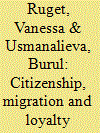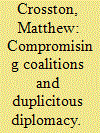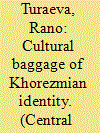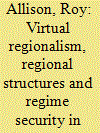| Srl | Item |
| 1 |
ID:
083726


|
|
|
|
|
| Publication |
2008.
|
| Summary/Abstract |
Building upon recent studies in the field of citizenship and transnationalism, this article examines the relations that Kyrgyzstani migrants in Kazakhstan and Russia entertain with their homeland, both in terms of concrete status (rights and responsibilities) and subjective attitudes (feeling of membership and loyalty). The article relies on field research, including semi-structured interviews, conducted in March and April 2007. Findings show that Kyrgyzstani migrants have developed a distinctive and somewhat paradoxical relation to their state of origin, in which pragmatic interest and long-term loyalty are not easily reconciled
|
|
|
|
|
|
|
|
|
|
|
|
|
|
|
|
| 2 |
ID:
083729


|
|
|
|
|
| Publication |
2008.
|
| Summary/Abstract |
This article investigates the development of democracy in Tajikistan and analyzes what has earned it the most international acclaim: its secular-Islamic governing coalition. The investigation reveals a compromised and illegitimate coalition that, with American collusion in local regime repression, poses great dangers to international security. The article argues that government repression, leading to increasing radicalization, combines with foreign aid to damage long-term democracy potential in Tajikistan but also works against global security interests by creating doubt about American intentions and possibly allowing a concomitant rise in Islamic radicalism
|
|
|
|
|
|
|
|
|
|
|
|
|
|
|
|
| 3 |
ID:
083727


|
|
|
|
|
| Publication |
2008.
|
| Summary/Abstract |
After Uzbekistan gained its independence from Soviet rule, important political and economic changes took place. The mobility of the population has since then increased drastically and created new spaces for the negotiation of social identities as well as new strategies for identity politics among the culturally and regionally diverse population of Uzbekistan. This article aims to contribute to the discussions on social identity and its 'contents' in the light of migration processes. The main argument centres on the importance of what Barth called the 'cultural stuff' of social identities when maintaining boundaries during identification processes. The analysis focuses specifically on certain singing and dancing practices of Khorezmians. It shows how these practices survive, but are also transformed in the context of Tashkent, the capital city of Uzbekistan, where people from different regions reside together and are engaged in performing and presenting their own group identity in reference to 'others'
|
|
|
|
|
|
|
|
|
|
|
|
|
|
|
|
| 4 |
ID:
083728


|
|
|
|
|
| Publication |
2008.
|
| Summary/Abstract |
This article aims to examine the modus operandi of the Aga Khan Foundation and its Mountain Societies Development Support Programme (MSDSP) in Tajikistan's Rasht valley. As one of the few non-governmental development programmes from the wider Islamic world in an area where the Sunni beneficiary base is of a different Islamic tradition than the Ismaili Shi'ite community the Foundation is connected with, the MSDSP gained importance and legitimacy as a rehabilitator and provider of public services and social infrastructure that were once provided by the state. The article pays particular attention to the ways of transcending the Sunni-Ismaili divide between aid providers and beneficiaries, as well as to more recent social changes which increasingly challenge the MSDSP's use of traditional local institutions for programme implementation
|
|
|
|
|
|
|
|
|
|
|
|
|
|
|
|
| 5 |
ID:
083725


|
|
|
|
|
| Publication |
2008.
|
| Summary/Abstract |
Internal and international labour migration is a main livelihood strategy for many people in rural areas of Kyrgyzstan. It is estimated that approximately one-third of the employable population of Kyrgyzstan is working abroad. However, current labour migration phenomena are not exceptional since Central Asia's history has always been characterized by the movement of people, including external and internal, forced and voluntary, legal and illegal, permanent and temporary, ethnically or economically motivated migration. This article gives an overview of the historical and present migration processes with a special focus on three village communities in rural Kyrgyzstan. It deals with the opportunities and difficulties with which labour migrants and their non-migrating family members are confronted today. The results are based on extensive field work in Kyrgyzstan
|
|
|
|
|
|
|
|
|
|
|
|
|
|
|
|
| 6 |
ID:
083730


|
|
|
|
|
| Publication |
2008.
|
| Summary/Abstract |
The failures of regionalism and regional structures for cooperation between the five CIS Central Asian states are well studied. However, explanations so far do not convincingly account for the apparent enthusiasm of these states for the macro-regional frameworks of the Eurasian Economic Community, the Collective Security Treaty Organization and the Shanghai Cooperation Organization. This article argues that, as with previous efforts at Central Asian regional self-organization, these broader organizations still largely represent a form of 'virtual regionalism'. But for the Central Asian states they offer a new and increasingly important function, that of 'protective integration'. This takes the form of collective political solidarity or 'bandwagoning' with Russia (and China in the SCO) against processes and pressures that are perceived as challenging incumbent leaders and their political entourage. A primary motivation for Central Asian leaders' engagement in the EAEC, CSTO and SCO, therefore, is the reinforcement of domestic regime security and the resistance of 'external' agendas of good governance or democracy promotion. These goals are concealed behind a discourse that denigrates the imposition of external 'values' and continues to give pride of place to national sovereignty. This offers little to overcome the underlying fractures between states in Central Asia.
|
|
|
|
|
|
|
|
|
|
|
|
|
|
|
|